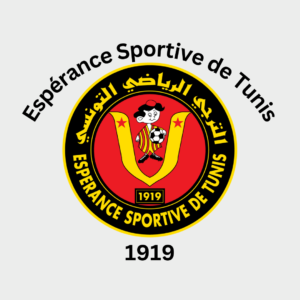History of Esperance Sportive de Tunis Football Club
The history of Esperance Sportive de Tunis Football club (commonly known as Espérance or EST) is one of the most successful and historic football clubs in Tunisia and Africa. The club was founded on March 15, 1919, in the capital city of Tunis. Its establishment is closely tied to the cultural and political context of Tunisia during the early 20th century, a time when the country was under French colonial rule.
Founding and Early Years
The creation of Espérance de Tunis stemmed from the desire of a group of local sports enthusiasts, particularly from the Tunisian elite and the Arab nationalist movement, to create a club that would promote Tunisian identity and foster national pride. Initially, the club was named “Espérance Tunis”, reflecting its aspirations for hope and progress. The founding members of the club were young Tunisians who wanted to establish a sports club that would not only compete in football but also represent the ideals of nationalism and independence.
The early years of the club were focused on the development of various sports, with football being the most prominent. As Tunisia was still under French colonial rule, it was difficult for the club to thrive initially, but it became a rallying point for local Tunisians looking to assert their identity.

Post-Independence Success
Following Tunisia’s independence from France in 1956, Espérance de Tunis began to expand its influence both locally and regionally. The club quickly became a prominent figure in Tunisian football, winning its first Tunisian League title in 1959. The establishment of a strong footballing infrastructure during this period helped Espérance become one of the top clubs in the country.
Espérance’s success was also marked by the club’s ability to nurture local talent. Players like Rachid Krami, Ali Bougherra, and Tahar Chérif El-Ouazzani became legendary figures for the club, cementing their status as some of Tunisia’s finest footballers.
Continental Success Espérance de Tunis reached new heights of achievement in the African Champions League. They won their first CAF Champions League title in 1994, a victory that helped solidify their reputation as one of the top football clubs in Africa. The club’s success in the CAF Champions League was followed by several more continental trophies, making Espérance one of Africa’s most decorated clubs.
In 2011, Espérance became the first team to win the CAF Champions League twice in a row, marking an extraordinary period in the club’s history. The team’s domestic dominance also continued with multiple Tunisian Ligue 1 titles, solidifying their position as the country’s premier football team.
Modern Era – In the present day, Espérance de Tunis continues to be a dominant force in Tunisian football and one of Africa’s leading clubs. The team plays at the Stade Olympique de Rades, a stadium that can hold 60,000 spectators, where the club enjoys immense support from its passionate fanbase, known as the “Ultras”.
Espérance’s commitment to both domestic and international success has ensured its place as one of the most storied football clubs in Africa, with an impressive legacy of trophies and accolades in both local and continental competitions. The club’s history is one of resilience, national pride, and sporting excellence.

15 interesting facts about Esperance Sportive de Tunis Football club
- Founding as a Symbol of Nationalism
Espérance Sportive de Tunis was founded in 1919 during a period of French colonial rule. The club was established not only as a sporting institution but also as a symbol of Tunisian nationalism. It played a significant role in asserting local identity and promoting the Arabic culture in the face of colonial pressures. - Club’s Original Name and Meaning
The club was originally named “Espérance Tunis” to reflect the hopes and aspirations of the Tunisian people. The name “Espérance”, meaning “hope” in French, embodied the desire for progress, unity, and independence from French colonial rule. - First African Club to Win the CAF Champions League Twice
In 2011, Espérance de Tunis made history by becoming the first African club to win back-to-back CAF Champions League titles. Their victory in 2011 marked a remarkable achievement for Tunisian and African football. - Espérance’s Strong Ties to Politics
As a prominent club in Tunisia, Espérance has had historical ties to the country’s political landscape. Several of its founding members were active in the nationalist movement, and the club’s activities were closely linked to the struggle for Tunisia’s independence. - Club’s Iconic Red and Yellow Colors
Espérance’s colors, red and yellow, are deeply symbolic. The red color represents the bloodshed and sacrifices made by Tunisians during the fight for independence, while yellow symbolizes the wealth and prosperity of the nation. The colors are also an important part of the club’s identity. - Record Number of Tunisian League Titles
Espérance de Tunis has won the Tunisian Ligue 1 a record 31 times, making them the most successful club in the history of the competition. This domination highlights their long-standing presence at the top of Tunisian football. - Stade Olympique de Rades: A Fortress
Espérance’s home ground, the Stade Olympique de Rades, is known for its incredible atmosphere during matches. With a capacity of 60,000, the stadium is a true fortress for the club, and it plays a crucial role in their success. The passionate fans, known as the “Ultras”, create an intimidating atmosphere for visiting teams. - Espérance’s Contribution to Tunisian Football Talent
The club has produced many of Tunisia’s top footballers over the years. Players like Tahar Chérif El-Ouazzani, Rachid Krami, and Ali Bougherra all rose through the ranks of Espérance and went on to represent Tunisia internationally. - International Recognition in the 1990s
Espérance gained international recognition in the 1990s, particularly for its success in the CAF Champions League, where they emerged as one of the continent’s top teams. Their 1994 triumph in the tournament established them as a dominant force in African football. - A History of Rivalries
Espérance de Tunis has a fierce rivalry with Club Africain, another of Tunisia’s major clubs. The matches between the two, known as the “Tunis Derby”, are some of the most heated and passionate in Tunisian football, with intense competition both on and off the pitch. - Espérance’s Role in the African Super Cup
The club has been highly successful in the CAF Super Cup, winning the prestigious competition multiple times. Their consistent performance in both continental and regional tournaments has solidified their status as one of Africa’s premier football clubs. - Historical Players from Other African Nations
Over the years, Espérance has been home to several notable African players from outside Tunisia. Players from countries such as Algeria, Morocco, and Ivory Coast have contributed to the club’s success, enhancing its regional reputation and international appeal. - Support for Women’s Football
Espérance de Tunis has been a supporter of women’s football, with the club also having a women’s team. This commitment to gender equality in sports helps to empower young women in Tunisia and provides them with opportunities in football. - Celebration of the Club’s Founders
Espérance regularly honors its founding members, who played crucial roles in the club’s creation and its early struggles. The club’s centenary celebrations in 2019 paid tribute to their legacy and the long-standing impact they had on the history of Tunisian football. - Espérance’s Global Recognition
Beyond African football, Espérance is one of the most recognized clubs globally. Their participation in the FIFA Club World Cup and their successful continental campaigns have earned them respect and admiration across the football world.
Espérance Sportive de Tunis is not only a football club but a symbol of resilience, pride, and historical significance in Tunisia and Africa. With a rich history of success both domestically and internationally, Espérance continues to be a key player in African football.
